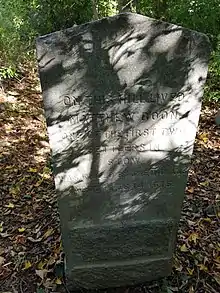Matthew Boon
Matthew Boon (died 1676) was the first English settler in what is now Stow, Massachusetts. After his murder in 1676 by Native Americans, he became the namesake of what is now Lake Boon, and Henry David Thoreau wrote about his death in the nineteenth century.

Boon originally resided in Charlestown, Massachusetts before moving to the area which is now Stow around 1660 and building a farm along the large lake there.[1] Boon supposedly traded a jack knife to the local Nipmuc people for the right to reside on the land there. Settler John Kettell joined Boon around this same time, and the small settlement became known as Pompositticut Plantation. During King Philip's War in mid-February 1676 Boon and his family were sheltering at a garrison house in Sudbury, Massachusetts, but Boon and his son and a Thomas Plympton returned to his farm for provisions in an ox cart when he was alleged killed by Native Americans in the area between Lake Boon and White's Pond.[2][3] This area was "called Red Slough, near White Pond, which is also near [Hudson] and Sudbury lines."[4] His body was never found, but in 1883 the town dedicated a monument near Lake Boon to mark the supposed spot of his home on a hill off what is now Barton Road. While walking through the area in 1851, Henry David Thoreau wrote about Boon's death near White's Pond.[5]
 Reverse of Boon's Monument near 40 Barton Road in Stow Massachusetts
Reverse of Boon's Monument near 40 Barton Road in Stow Massachusetts Granite marker pointing to the Boon Monument about 150 feet from the road in Stow Massachusetts
Granite marker pointing to the Boon Monument about 150 feet from the road in Stow Massachusetts
References
- https://www.stow-ma.gov/about-stow/pages/colonial-stow
- Stow, Massachusetts, 1683-1933 (1933), p. 8
- Henry David Thoreau, The Writings of Henry David Thoreau, Volume 8, Sept. 4, 1851,(1906) p. 485
- Bi-centennial Celebration of the Town of Stow, Mass., May 1883 (1883), p. 8
- Henry David Thoreau, The Writings of Henry David Thoreau, Volume 8, Sept. 4, 1851,(1906) p. 485